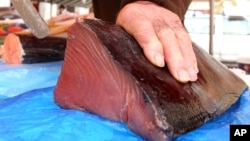The European Union on Tuesday gave Thailand a "yellow card" ultimatum to drastically alter its polices on illegal, unreported and unregulated (IUU) fishing or face a ban at the end of the year on exporting seafood to the EU.
Citing "clear deficiencies," the European Commission reported that action was taken "after thorough analysis of the country's legal framework, enforcement measures and administrative arrangement, which impact on Thailand's ability to comply with its international obligations."
If a "red card" ban is imposed on the Southeast Asian kingdom's seafood exports, that could cost Thailand more than $500 million per year.
The key EU concerns surround Thailand's failure to properly certify the origin and legality of its fish exports.
"Thailand is deeply disappointed at the EU’s decision," said the Ministry of Foreign Affairs in a statement but added that the government takes the allegations of IUU fishing seriously and "is now firmly seizing the issue."
Thailand's agriculture ministry launched a campaign in Phuket this week to improve the fishing industry’s practices. The government, under the control of a military-led junta since a bloodless coup 11 months ago, reportedly is writing stricter fishing regulations which are expected to be signed into law in July.
"The EU chose to ignore the very earnest efforts of the past six months by the Royal Thai Government in addressing all issues which once were deemed the causes of IUU fishing," said the MFA statement.
IUU fishing is an estimated $10 billion black market, accounting for about 15 percent of global catches, according to the EU and non-governmental environmental organizations.
Several NGO's welcomed the latest action against Thailand.
"Thailand must now take positive action and work with the European Commission to be delisted," said the Environmental Justice Foundation (EJF), Oceana, The Pew Charitable Trusts and WWF in a joint statement.
"Thai authorities exert very little control over their fishing vessels, with many activities illegally damaging fish stocks and the marine environment, and this is linked to some of the most exploitative and inhuman working conditions documented anywhere," said EJF executive director Steve Trent. "These conditions include the use of slaves and extreme violence."
Thailand faces a variety of reprimands, including a lowest Tier 3 ranking by the U.S. State Department for human trafficking and safety warnings issued for its commercial aviation sector by the International Civil Aviation Organization, a U.N. agency.
The junta has vowed to rectify all those concerns swiftly; it blames the problems on the civilian government it ousted.
The powerful domestic seafood industry, implicated in IUU fishing and human trafficking, is regarded as having significant political influence in Thailand.
Prime Minister Prayuth Chan-ocha, who carried out the May 22, 2014, coup as army chief, has sweeping powers under Section 44 of the junta's interim charter.
The European Commission on Tuesday acknowledged progress made by South Korea and the Philippines in "appropriate reforms of their legal systems and are now equipped to tackle illegal fishing." Thus, according to the EU, the "yellow-card" warnings against those two fishing nations are now withdrawn.
The European Union currently bans fish products caught by vessels from Sri Lanka, Guinea and Cambodia.




